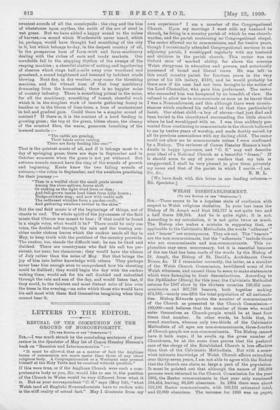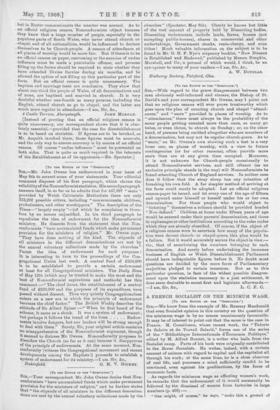WELSH DISESTABLISHM.ENT.
[To Till EDITOR or Till "SPECTATOR."] Srn,—There seems to be a hopeless state of confusion with respect to Welsh religious statistics. In your last issue the Bishop of St. Asaph said that 343,757 is not quite two and a half times 189,164. And he is quite right ; it is not. According to my calculation, it is not quite twice as much. The Bishop also makes a mistake in supposing that, as applicable to the Calvinistic Methodists, the words " adherent " and " hearer" are synonymous. They are not. The " hearers " are the non-communicants, but the "adherents "include those who are communicants and non-communicants. This ex- planation may seem unnecessary, but it is essential because of the use that has been made of the words by the Bishop of St. Asaph, the Bishop of St. David's, Archdeacon Owen Evans, Sm. If I remember correctly, the latter, as a member of the Welsh Church Commission, bewildered some of . the Welsh witnesses, and caused them to seetn to make statements which were damaging to their denominations. According to the Dyddiadwr (Diary) for this year, the Calvinistic Methodist returns for 1907 show in the thirteen counties 166,352 com- municants and 307,750 hearers, both together making 474,102,—nearly one-fifth the total population of all nationali- ties. Bishop Edwards quotes the number of communicants of the Church as presented to the Church Commission- 193,000—and believes that the number of those who would enter themselves as Church-people would be at least four times that number. In other words, he holds that, in round numbers, whereas only two-thirds of the Calvinistic Methodists of all ages. are non-communicants, three-fourths of Church-people are non-communicants. The Bishop cannot have it both ways; if he swells up the gross number of Churchmen, he at the same time proves that the pastoral care of the clergy of the Established Church is less effective than that of the Calvinistic Methodists. But with a some- what intimate knowledge of Welsh Church affairs extending over thirty-seven years, I am not able to agree with the Bishop that the Church can claim so large a part of the population. It must be pointed out that although the names of 195,004 persons were returned to the Church Commission for the year 1905, the Easter communicants in that year only numbered 134,414, leaving 60,590 absentees. In 1904 there were about 133,191 Easter communicants, with 160,191 estimated total, and 27,000 absentees. The increase for 1905 was on pnper,
but in Easter communicants the number was normal. As to an official religious census, Nonconformists object because they know that a large number of people, especially in the Populous parts of South Wales, who never attend church or chapel, and of all nationalities, would be influenced to declare themselves to be Church-people. A census of attendance at all places of worship would be more fair. But if there is to be tin official census on paper, canvassing or the exercise of undue Influence must be made a punishable offence, and persons filling up the forms should be required to state whether they have attended Divine Service during six months, and be allowed the option of not filling up this particular part of the form. But an official census is quite unnecessary. The baptism and marriage tests are conclusive. They show that about one-third the people of Wales, of all denominations and of none, are baptised and married in church. It is very doubtful whether one-fourth as many persons, including the English. attend church as go to chapel, and the latter are much more regular in attendance.—I am, Sir, etc., 4 Castle Terrace, Aberystwyth. JOHN MORGAN.
[Instead of proving that an official religious census is quite unnecessary, our correspondent shows that it is abso- lutely essential,—provided that the case for disestablishment is to be based on statistics. If figures are to be invoked, as Mr. Asquith invoked them, those figures must be accurate, and the only way to ensure accuracy is by means of an official census. Of course "undue influence" must be prevented on both sides. That is quite as much required in the interests of the Establishment as of its opponents.—En. Spectator.]











































 Previous page
Previous page